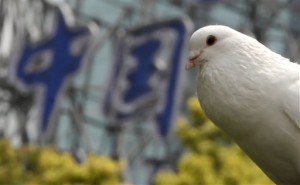China reports four more cases of new bird flu strain

A dove rests on a tree near a Chinese sign read as “China” at a park on Monday, April 1, 2013 in Shanghai, China. Two Shanghai men have died from a lesser-known type of bird flu in the first known human deaths from the strain, and Chinese authorities said Sunday it wasn’t clear how they were infected but there was no evidence of human-to-human transmission. AP FILE PHOTO
SHANGHAI—Four more people in China have been infected with a new strain of bird flu, a local government said Tuesday, bringing the country’s total to seven.
The announcement follows Sunday’s disclosure of three infections — two of them fatal — elsewhere in China, the first time the H7N9 strain of avian influenza is known to have been transmitted to humans.
On Tuesday the health bureau in the eastern province of Jiangsu said three women and one man had contracted H7N9 avian influenza.
All were undergoing medical treatment and there was no evidence yet to link the four, who lived in different cities, it said in a statement.
One of the patients from Nanjing city worked slaughtering live poultry, but the others had no such contact.
Article continues after this advertisementThe central government announced Sunday that two men, aged 87 and 27, died in Shanghai in early March after being infected with H7N9.
Article continues after this advertisementIt said a woman from the eastern province of Anhui was in critical condition after being infected with the strain.
The World Health Organization on Tuesday played down fears over the new type of bird flu, but said it was crucial to find out how the virus infected humans.
“It is of concern to WHO and we will be following this with the health authorities in China to know more,” spokeswoman Fadela Chaib told reporters in Geneva before the new cases were announced.
The Shanghai government said Tuesday the city would take more steps to prevent the spread of the new sub-type.
These included setting a designated hospital, isolating patients and reporting daily on cases, officials told a hastily-organised news conference.
The move was a result of the city announcing a “level three” response under a four-level scale of national guidelines for epidemics, one being the most severe, they said.
Level three means human infection has occurred but no human-to-human transmission is known, according to China’s National Health and Family Planning Commission.
Shanghai officials defended the delay in announcing the cases, around three weeks after the second man died.
“Under the current situation, to identify a new virus in 20 days is an extremely short time, in my opinion,” said Wu Fan, director of the Shanghai Center for Disease Control.
The officials also denied that thousands of dead pigs found floating in the city’s main river last month carried bird flu, as just-completed testing of some of the carcasses had been negative.
The more common strain of avian influenza, H5N1, killed more than 360 people globally from 2003 until March 12 this year, according to the WHO.
China reported two deaths from H5N1 in the southwestern province of Guizhou in February, the country’s first cases of that variety so far this year.
China is considered one of the countries at greater risk from bird flu because it has the world’s biggest poultry population and many chickens in rural areas are kept close to humans.